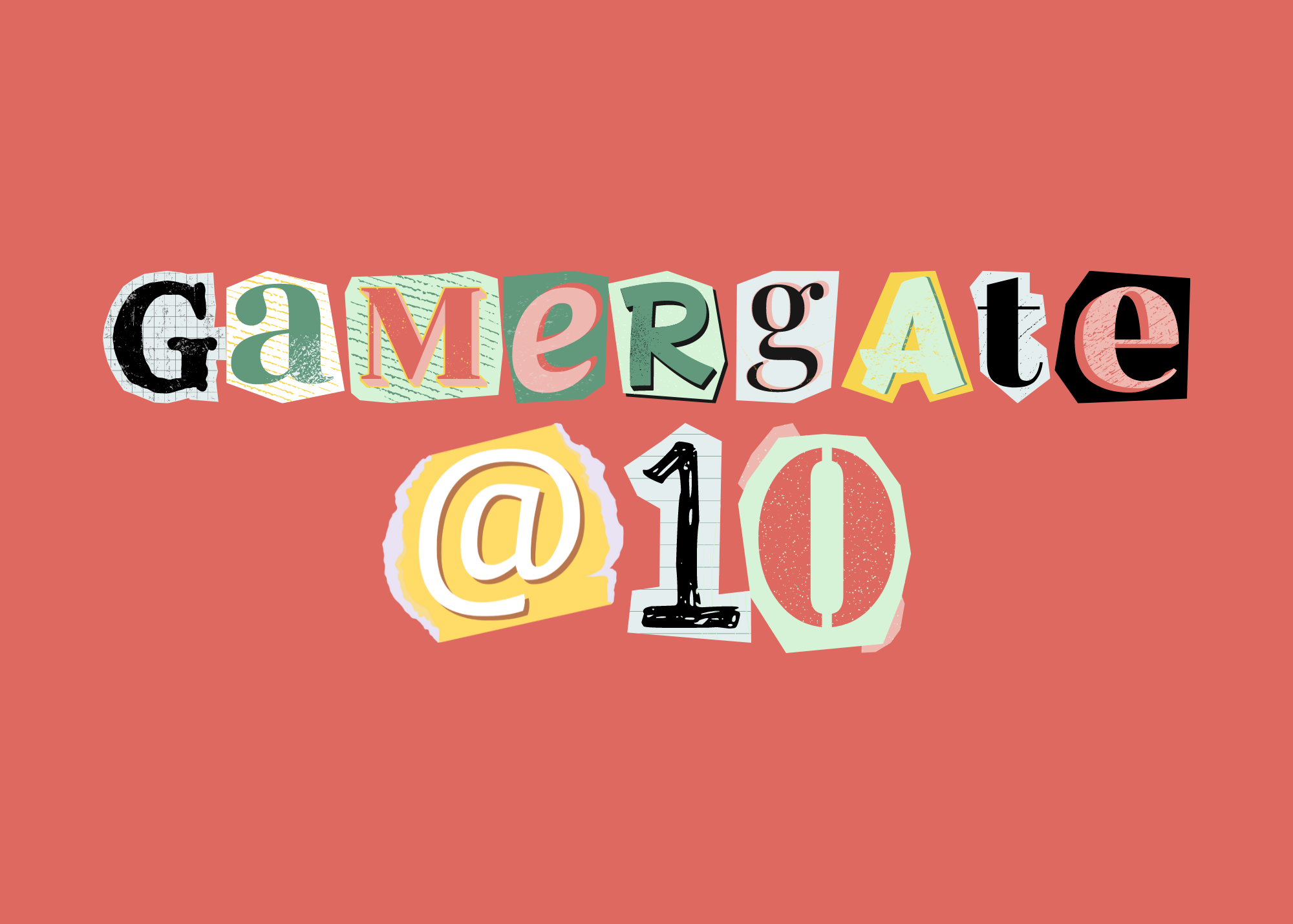Hi, hello! You’re currently a ✨free✨ subscriber to Links I Would Gchat You If We Were Friends, a digital culture newsletter for people who miss the old internet. This newsletter is more-or-less my full-time job, but I put very little behind the paywall in an effort to keep it accessible for everyone who reads it. If you’d like to support this work, please consider a paid subscription. Thanks very much, and enjoy this week’s edition! The Links x Hivemind Swarmed reading guide to Gamergate8 books, movies and readings for understanding the "human side" of one of the internet’s ugliest conflictsDavid Wolinsky remembers when being online felt fun. He couldn’t say precisely when that feeling curdled, but Gamergate was something of a critical juncture. In 2014, Wolinsky was working as a freelance journalist and watching, aghast, as gaming culture melted down. Unsettled by all the ugliness and alienation he saw on social media, he began interviewing underrepresented gamers and game developers to understand their experience of the internet and where it had apparently gone so wrong. Some 500 interviews later, Wolinsky said he’s both disillusioned and vaguely optimistic. On August 13, he published a sweeping oral history — The Hivemind Swarmed: Conversations on Gamergate, the Aftermath, and the Quest for a Safer Internet — that distills much of what he learned across 10 years and hundreds of hours of conversation. Naturally, when I looked for partners to collaborate on a Gamergate reading guide, Wolinsky was at the top of the list. I appreciate both his deep knowledge of video game culture and his unusually humanistic approach to all of this. Wolinsky is deeply interested in the big-picture cultural and psychological factors that cause people to act out, for good or ill, online; during a single 90-minute interview, he used the word “human” 14 times. “There’s this very human side of the internet that I think is easy to gloss over,” Wolinsky told me. “The game aspect isn’t even that important necessarily. It’s more a question of, what are we doing here? Why are we doing this to each other?” “Which is so corny,” he acknowledges, a second later. Corny or no, I think it’s a good perspective for understanding the online environment we have now. So, to compile this syllabus, Wolinsky and I both went through our respective notes and pulled materials we’ve returned to, again and again, as we each seek to explain the culture that Gamergate wrought. This is a little different from the four previous reading guides I’ve done: To honor Wolinsky’s approach to the topic, we’ve included a number of selections that relate to Gamergate more abstractly or thematically, as opposed to focusing exclusively on articles that documented the campaign as such. This is also the fourth and final installment of Gamergate @ 10, a month-long Links retrospective on the legacy of one of the worst and most pivotal events in modern internet culture. (If you’re not familiar with Gamergate or new to the series, you might want to start with this opening explainer.) Comments on this series are limited to paid subscribers, who made it possible for me to devote lots of extra time to reporting these pieces and recruiting guests like Wolinsky. If you’d like to support this and other Links projects, please consider upgrading your subscription. And if you’re interested in reading more from Wolinsky, The Hivemind Swarmed is available on Bookshop.org and wherever else you buy your longform reads. Stephen Thompson, the co-host of NPR’s Pop Culture Happy Hour, called it “an essential document” … high praise indeed!! “The Future Of The Culture Wars Is Here, And It’s Gamergate,” by Kyle Wagner for Deadspin (2014)I think it makes sense to start here, with one of the earliest, truly excellent pieces on Gamergate and its aftermath. Even in October 2014, when a certain digital fog of war still surrounded the whole mess, Kyle Wagner already understood it as a forerunner to, and epitome of, modern grievance politics: “What we have in Gamergate is a glimpse of how [culture war] skirmishes will unfold in the future,” he wrote, with “all the rhetorical weaponry and siegecraft of an internet comment section brought to bear on our culture.” —CD I’ve referred back to this piece many times — it’s very in-depth. It lays a lot out. And it appeared on Deadspin just a couple months after Gamergate started, which to me is wild. Deadspin is a sports website, obviously, but sometimes when there are people on the outside of something looking in, and they’re sincerely curious, that’s when you can get the really comprehensive perspectives. They know what questions to ask. And I don’t know Kyle or his other work, but he had a handle on it and grasped the significance of what was happening. But also? Nobody gives you points for predicting the future ahead of time. It’s too early. People will barely listen in real-time. —DW Tomorrow, and Tomorrow, and Tomorrow, by Gabrielle Zevin (2022)First of all, I should probably say that most everyone I know who lives and breathes video games fucking hates this novel. But I think people don’t like being seen, really, and whether or not you like the writing or the style of the book, it does an excellent job explaining how deeply individual, personal and powerful gaming is for many people. It’s a source of community and connection — in the book, a community of two people. [Note: Tomorrow, and Tomorrow, and Tomorrow follows the complicated, decades-long relationship between two childhood friends who go on to found a video game company together.] There’s been some resistance in the gaming industry to the idea that we should understand how an individual game came to be or the work that went into it. There’s this notion that the game should speak for itself. But this book portrays video games in a very human way that really speaks to me. —DW This is easily one of my favorite novels of the past two years, and that has nothing to do with the gaming angle (!). I thought it was a really extraordinary portrayal of adult friendship, with all its vagaries and complications. But I loved when David suggested it for this reading guide, because it also illustrates the stakes of gaming, and gaming communities, for the people enmeshed in them. You begin to understand how Gamergate grew out of this specific community, and not the fandom of some other form of entertainment. —CD “Zoë and the Trolls,” by Noreen Malone for New York (2017)Speaking of the living, breathing humans behind games: Gamergate was, of course, a massive cultural phenomenon, and we should talk about that. But it was also, importantly, the deeply personal story of one specific individual: Zoë Quinn, the independent game developer whose ex-boyfriend instigated Gamergate by posting an abusive screed about their relationship. This profile of Quinn coincided with the publication of her memoir, Crash Override. I admittedly haven’t read that book. But this piece is a vivid and masterful portrait, as you’d expect from Noreen Malone. And it definitively separates Quinn, the person, from Quinn, the reductive internet symbol. —CD “Why Women Aren’t Welcome on the Internet,” by Amanda Hess for Pacific Standard (2014)I probably read this story at least once a month throughout the trash year that was 2014 — a year in which I often wrote about, and also experienced, vicious online misogyny. My recollection is that Hess’ story, which ran months before Gamergate, was the first to fully and seriously capture the extent of the abuse many women experienced simply for existing on social media; it also laid out the causes and consequences of online harassment in a way that made it increasingly difficult for platforms, law enforcement and other authorities to gesture vaguely at “trolls” and “boys-will-be-boys” behavior. —CD Geeks: How Two Lost Boys Rode the Internet Out of Idaho, by Jon Katz (2000)I think a big part of understanding Gamergate is remembering where a lot of boy nerds came from. Not in a way that you’re sympathetic to Gamergaters attacking people, to be clear — but just as a means of understanding the underlying history and culture. People forget that video games used to be very outsidery. The two boys in this book were initially just loser nerds in rural America who were addicted to the internet and didn’t see any way forward. It becomes a really touching story — and it’s a true story, it’s non-fiction — as they learn to use the internet as a force for connection and good. This is a bit of a forgotten book, 24 years later, but I think it’s helpful for understanding what the internet and video games meant to a certain type of young man: why video games were so central to their identity, why it felt like something they had to “protect,” even as a pretext for attacking someone else. I think it helps you see some of the other flaws in our culture that let things get so bad. Now I’m wondering what happened to the dudes in the book. For all I know they stormed the Capitol. —DW Feels Good Man (2020)This documentary is an easy recommendation if you want to understand chan culture and how it’s affected the wider internet. It’s also just a really excellent example of how to communicate insane internet stuff to normies: It gets into the origins of the Pepe the Frog meme, walks through 4chan in a really nuanced way and explains how Pepe became a symbol of hate and racism, basically. It also, in a way, winds up documenting how the Anti-Defamation League let down the cartoonist Matt Furie, who is still very clearly traumatized by his creation being mangled, twisted and appropriated. This meme was mutated and minted by part of the same chan culture stuff that influenced Gamergate and that dark corner of the internet. —DW “Everything is Gamergate,” by Charlie Warzel, Brianna Wu, Joan Donovan and Sarah Jeong for The New York Times (2019)If you read one recommendation from this list — and truly, what kind of sicko wants to read that much more? — I’d probably point you to the opening essay from the Times’ five-year Gamergate retrospective. Charlie Warzel powerfully (and succinctly!) lays out how Gamergate predicted so much of contemporary public life, from anti-DEI backlashes and harassment influencers to the role of disinformation in political discourse. The other pieces in this package are worth reading, too (I’d flag Brianna Wu’s op-ed on industry changes since Gamergate, in particular) but the Warzel essay strikes me as a really clear-eyed distillation of modern political/interpersonal conflict and Gamergate’s influence. —CD High Conflict: Why We Get Trapped and How We Get Out, by Amanda Ripley (2021)I can’t remember how this book first got on my radar — a conflict mediator might have recommended it to me. But I inhaled it in like, 72 hours once I started reading it. It’s brilliant. It really speaks to this fundamental abstract question of why, when you have a critical mass of people in a place like Twitter or Facebook, they seem to get stuck in these very explosive, inescapable conflicts. Everything gets boiled down to binaries: you have to be on this side or the other. Everyone misses what Ripley calls “the understory” — that’s the real reason that people are fighting, the part of the iceberg that’s always underwater. She threads together a lot of stories in a really great, nonjudgmental way, and there’s a whole appendix of actionable information at the end of the book. “Are you stuck in a high conflict situation? Here’s how you get out of it.” I found High Conflict very, very helpful in thinking about Gamergate and pushing past some of the ways it’s most often characterized on the surface — which is still more often than now, how Gamergate is thought about today. There are elements of it that have to do with video games and video game culture, of course. But the parts of Gamergate that were so bad and so ugly were not endemic to gaming — volatile conflicts are part of human nature. I like pairing High Conflict with Arthur C. Brooks’ Love Your Enemies, as well. High Conflict is about looking at what other people are doing and trying to make sense of it; Love Your Enemies is about looking at yourself and trying to understand your own reactions and behaviors in high-conflict situations. It’s helped me understand my place in these difficult conversations about Gamergate, and it’s also helped me connect with other people on the topic. —DW Further reading & viewing:
More in this series:You’re currently a free subscriber to Links I Would Gchat You If We Were Friends. Upgrade your subscription to support this project and get the full experience. Paywall policy • Instagram • Threads • Send me a coffee • Referral program |






